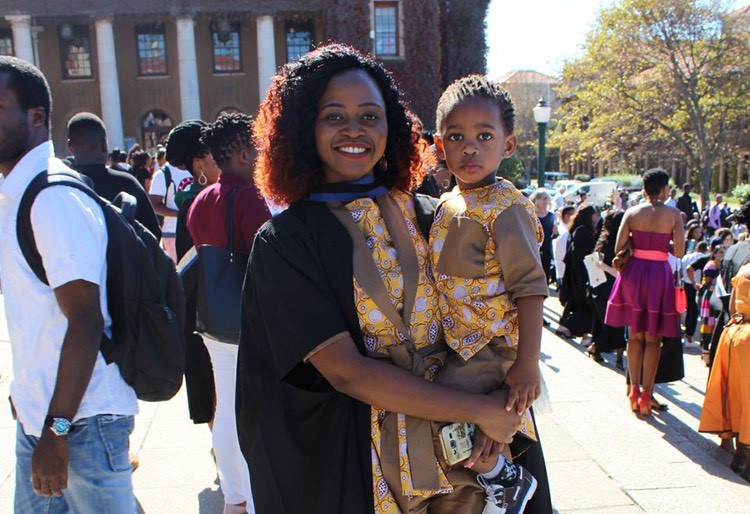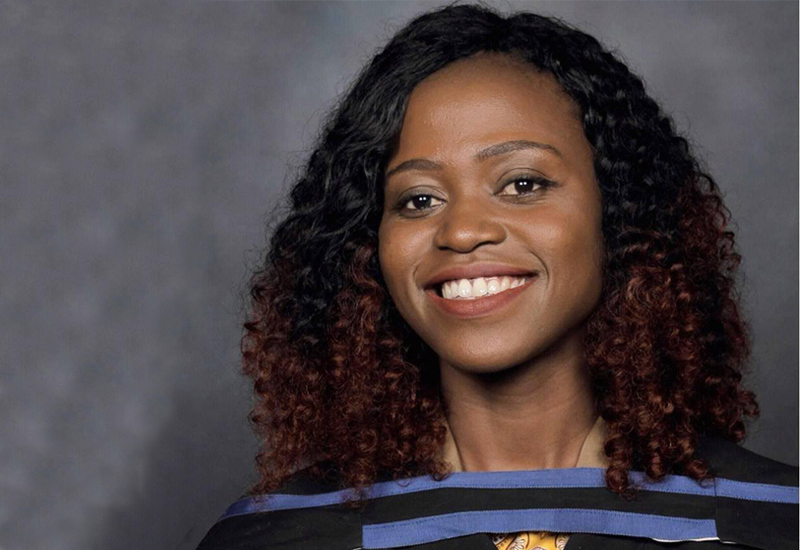The student/mother juggling act
09 May 2019 | Story Niémah Davids. Read time 7 min.
While it’s universally accepted that mothers have one of the most important and demanding jobs in the world, what happens when they combine this role with another vitally important task? One that involves lectures, assignments and exams…
A research paper by University of Cape Town (UCT) master’s student Jill Chidisha Samukimba, titled Mothers in Academia: Exploring student mothers’ experiences of institutional culture within the University of Cape Town, seeks to answer exactly that question.
Samukimba, who is doing her Masters of Philosophy in Development Studies, highlighted the university’s growth areas, and the gaps, as she delved into the on-campus environment to determine how inclusive it is for young student mothers.
It’s evident, she said, that progress has been made – but there’s still work to be done.
Samukimba suggests that many mothers have a desire to acquire a tertiary qualification, but that certain institutional cultures at universities prevent this. As a result, the students are forced to leave their children with their parents or extended families while they pursue their degrees.
“I believe that the lack of supportive structures for many mothers at [university] is one of the major reasons for this,” she said.
“Even though UCT is slowly breaking the heteronormative ideas that create binaries, mothers still fall [through] the cracks and are often forced to negotiate their roles as mothers and students.”
“Even though UCT is slowly breaking the heteronormative ideas that create binaries, mothers still fall [through] the cracks and are often forced to negotiate their roles as mothers and students.”
Samukimba’s research focused on both under- and postgraduate students at UCT. While the latter reported a fairly seamless university experience, the undergraduates experienced more limitations related to their dual role.
A balancing act
Overall, however, they all shared the same sentiment: Balancing their parental demands with the demands of their degree had not been easy.
During interviews for her paper, the respondents told Samukimba that it was impossible to pursue their studies without the support of both their families and the university.
“All participants stress the importance of [a] support system for mothers in academia,” she said.
Samukimba, herself a single mother and student living far from home, said she had experienced first-hand the challenges that came with being an academic mother and was interested in establishing how other student mothers in the same position cope.

“I had to rely heavily on my friends and church elders to make it through my last trimester of my pregnancy [and] the early days after my delivery.
“I was interested to find out how these first-time mothers who are also students balance both roles,” she said.
Interestingly, Samukimba pointed out, all the mothers reported receiving some support from UCT, but that this wasn’t consistent.
Support structure
Currently, the university’s Educare Centre provides daycare for preschoolers whose mothers and/or fathers are UCT staff and students. This offers parents, especially studying mothers, peace of mind that their children are being cared for on campus while they study and attend lectures.
Similarly, said Samukimba, UCT’s family residence – JP Duminy Court – provides accommodation for students with spouses and children. It is the institution’s only family residence and is centrally situated near all amenities for convenience.
On the downside, preference for accommodation here is given to postgraduate student mothers. One of her respondents, an undergraduate, waited a long time before an apartment was made available for her.
Even then, said Samukimba, undergraduates who do reside at JP Duminy Court may not participate in some residence activities, especially those related to leadership roles.
“The fact that postgraduate studying parents are given priority is problematic,” she said.
“[Other] residences don’t accommodate a mother living with her children, so once a mother is denied an offer into JP Duminy Court, it is impossible for her to experience residence life.”
“[Other] residences don’t accommodate a mother living with her children, so once a mother is denied an offer into JP Duminy Court, it is impossible for her to experience residence life.”
Maternity leave
Parents’ clubs and societies and leisure spaces on campus that accommodate both mothers and children are also lacking, her research found.
“I have never come across anything with parenting. It’s quite amazing because there are so many parents here at UCT,” one respondent said.
Samukimba said all the mothers highlighted the need for additional support structures that involve support groups and coaching on how to cope while studying. They also felt that a platform to talk about their experiences and challenges would be helpful, especially for pregnant students.
“This would give them the opportunity to learn from mothers who have managed to succeed within this space against all odds,” she said.
Student maternity leave was another issue raised by respondents. Students are only allowed to take a leave of absence if they are pregnant, which means they are away from class for a full semester.
“When it comes to maternity leave, UCT’s institutional culture is highly exclusionary as it only caters for those ‘allowed’ to have babies – who are mainly permanent staff and not students. [This] could create a sense of vulnerability, isolation and an overwhelming sense of stress and pressure,” Samukimba’s research found.
So while UCT does support student mothers to a large extent, the number of restrictions should be addressed in order to provide both under- and post-graduate student mothers with the same holistic experience, she suggested.
“The kind of data collected served as an eye-opener. The issue of motherhood and educational institutional culture is complex in nature, and it’s only through the critical analysis of experiences that we get a clear picture,” Samukimba said.
 This work is licensed under a Creative Commons Attribution-NoDerivatives 4.0 International License.
This work is licensed under a Creative Commons Attribution-NoDerivatives 4.0 International License.
Please view the republishing articles page for more information.










